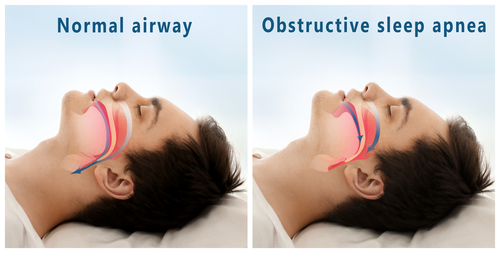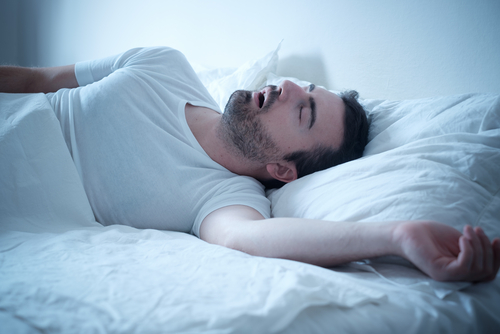Your Guide to Understanding Sleep Apnea
Getting the best treatment for your sleep apnea symptoms begins with understanding your condition, and how it can harm your overall health. Unfortunately, many patients are unaware of their disorder and don’t seek treatment as a result. According to statistics, 22 million Americans suffer from sleep apnea, but 80% of moderate to severe cases are undiagnosed.
At our practice in Glen Mills, we emphasize early diagnosis and efficient treatment solutions to keep your condition under control. Explore our guide to learn all about sleep apnea and how it affects you.
Types of Sleep Apnea
 There are three types of sleep apnea: obstructive, central, and complex. Obstructive sleep apnea (OSA) is the most common type. In this form of the disorder, your throat muscles relax and your tongue collapses into your airway, obstructing your flow of oxygen.
There are three types of sleep apnea: obstructive, central, and complex. Obstructive sleep apnea (OSA) is the most common type. In this form of the disorder, your throat muscles relax and your tongue collapses into your airway, obstructing your flow of oxygen.
Central sleep apnea describes when your brain fails to send the proper signals to your muscles that control breathing. Rather than struggling to breathe as with OSA, patients with this condition actually forget to breathe while they sleep.
Complex sleep apnea is a combination of the other two forms. For patients who are diagnosed with complex sleep apnea, the best method is to treat your condition as both obstructive and central until you find a practical solution that works.
How Sleep Apnea Affects You
 Regardless of which form you suffer from, the effects of sleep apnea are consistent. It partially or totally blocks your airway throughout the night, causing you to wake up every time you stop breathing. This pattern can repeat anywhere from five to fifty times per hour, preventing you from enjoying the quality rest you need.
Regardless of which form you suffer from, the effects of sleep apnea are consistent. It partially or totally blocks your airway throughout the night, causing you to wake up every time you stop breathing. This pattern can repeat anywhere from five to fifty times per hour, preventing you from enjoying the quality rest you need.
When you airway is blocked, it can also result in loud snoring or choking sounds overnight. If you share your bed with a partner, this can disrupt their sleep as well and form a rift in your relationship.
Consequences of Untreated Sleep Apnea

Without treatment, sleep apnea can result in major consequences for your overall health. Some of these include:
- Heart attacks/heart disease
- High blood pressure
- Strokes
- Diabetes
- Weight gain
- Chronic headaches
- Mood swings/irritability
- Short attention span/memory problems
In addition to everything listed above, sleep apnea impairs your ability to function normally on a daily basis. You’re more likely to zone out and make dangerous mistakes, like losing your focus while driving and causing a car accident.
Visit Dr. McCoy for Sleep Apnea Treatment
 If you’ve been diagnosed with sleep apnea, don’t hesitate to seek treatment. The longer you wait, the higher your risk will be for developing complications. At Progressive Dentistry, Sleep & Wellness, we emphasize practical, preventive care that isolates your symptoms and addresses them head-on.
If you’ve been diagnosed with sleep apnea, don’t hesitate to seek treatment. The longer you wait, the higher your risk will be for developing complications. At Progressive Dentistry, Sleep & Wellness, we emphasize practical, preventive care that isolates your symptoms and addresses them head-on.
Dr. McCoy has achieved Diplomate status with the American Board of Dental Sleep Medicine, an honor that can only be achieved by completing over 50 hours of continuing education and presenting at least five successful oral appliance cases, among other requirments.
Contact our practice in Glen Mills today and schedule a consultation with Dr. McCoy. Rest assured, we can help you sleep soundly through the night.
Frequently Asked Questions
Can sleep apnea be cured?
Sleep apnea can be cured in very rare cases through weight loss or surgery. Surgery is used only as a last resort because it can have side effects.
Oral appliance therapy is a reliable treatment that can improve your day-to-day life by allowing you to sleep without interruptions. Oral appliances don’t cure sleep apnea but they relieve symptoms of sleep apnea so you can have more energy.
Dr. McCoy also offers treatment with Vivos, a potentially permanent sleep apnea solution. Vivos has the ability to change the structure of your jaw in order to relieve sleep apnea symptoms.
How does sleep apnea affect the body?
Sleep apnea obstructs your airway while you sleep, causing pauses in breathing that force your body to wake up momentarily. While many people affected by sleep apnea wake up hundreds of times every night, most don’t remember these episodes.
But waking up throughout the night affects your ability to reach the REM stage of sleep, leading to symptoms of sleep deprivation that can affect your physical and mental health. People with sleep apnea are more likely to experience depression and anxiety.
Sleep apnea can also lead to serious physical health conditions such as high blood pressure, heart attacks, type 2 diabetes, and strokes. Indirect safety risks include a higher likelihood of being involved in an automobile accident and unemployment.
What are the symptoms of sleep apnea?
The top three sleep apnea symptoms to look out for are:
-
- Snoring: While not all snorers have sleep apnea, loud or consistent snoring is a potential sign of the disorder. We recommend undergoing a sleep study if you snore frequently. Oral appliance therapy can also help stop the sound of snoring.
- Pauses in breathing or gasping during sleep: If someone notices that you stop breathing and gasp for air while you’re asleep, a sleep test is highly recommended. You likely stop breathing while you’re asleep, causing detrimental health effects.
- Daytime fatigue: Feeling tired during the day isn’t abnormal, but if you consistently feel exhausted you might have a sleep disorder. Sleep apnea deprives you of well-needed rest and impacts your ability to function throughout the day.
Will sleep apnea stop me from driving?
A sleep apnea diagnosis will not prevent you from being allowed to drive. However, if you have untreated sleep apnea you’ll be putting yourself and others at risk. People with sleep apnea are much likelier to be involved in automobile accidents.
Falling asleep at the wheel is one risk, but it isn’t the only one. When you’re driving, your safety can depend on how fast your reflexes and reaction times are. If you’re fatigued from waking up all night, your ability to react to dangerous situations on the road can be impaired.
Sleep apnea treatment can enable you to drive without these dangers. You’ll be able to get enough sleep so you can safely drive.
"*" indicates required fields
